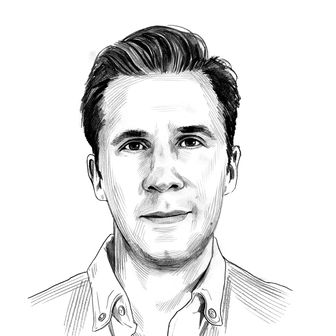
On Tuesday, at an internal, all-hands meeting, a parade of Uber executives and directors announced a set of sweeping changes to company policy stemming from an investigation into what had become a rotten internal culture. Maybe unsurprisingly, Uber leadership wasn’t able to make it through the meeting without a major unforced error — David Bonderman, a board member, suggested that the presence of Arianna Huffington, the board’s only female member, had produced “more talking” at its meetings — but the recommendations themselves seemed reasonable and thoughtful, from the small-scale — weekly free dinner would now be served at seven, rather than eight, to better accommodate Uber employees with families — to the company-wide — Travis Kalanick, the founder and CEO to whom many of Uber’s cultural problems have been attributed, would be taking a leave of absence.
Though it didn’t get as much attention as Kalanick’s leave of absence, one notable consequence was that a few of Uber’s infamous 14 company values, some of which one former employee told me “people used as an excuse to just be assholes,” would be changed or scrapped altogether. “You know the cultural value about ‘Working smarter, longer, and harder’?” Huffington told the assembled employees. “Well, ‘longer’ is gone, because Uber is a data-driven company, and the data shows unequivocally that when you work longer, you’re not working smarter.”
That those values would be ditched or adjusted is important because they reflect a recognition that in many cases the same institutional values that enabled a toxic corporate culture have also forged a foundation for Uber’s business. Take, for instance, Huffington’s declaration about working shorter hours — an admirable shift in the company’s attitude that’s apparently not an ethos it’s willing to apply more broadly to its drivers. Last month, Uber responded to a Massachusetts proposal to cap driver hours at 70 in a given week, for safety reasons, by arguing that, “many individuals in many different industries work 70 hours in a seven-day period.” Uber refuses to consider its drivers employees who could receive benefits or a minimum wage, despite the fact that half of all Uber rides, and half of the company’s revenue, are provided by full-time drivers. A good night’s sleep apparently doesn’t apply to Uber’s drivers.
Other Uber values getting cut include “toe-stepping,” “hustling,” and “principled confrontation” — ideas that manifest themselves not just in an uncomfortable workplace environment but in Uber’s insistent refusal to agree to even the most basic restrictions on its business practices in the name of safety, privacy, or the common good. Kalanick in particular has long embodied and pushed the company’s hard-charging ethos and wholesale rejection of compromise. “He’s an ideologue,” one person close to Kalanick told me. “Not a political ideologue, but if he believes something is right, that’s it.” Several Uber employees pointed me to the company’s refusal to go along with calls for stricter background checks for drivers as emblematic of the company’s approach. While many on Uber’s public-policy team pushed to make that relatively simple concession, Kalanick and others on the business side of the company argued that it would slow the company’s growth. According to one person, Kalanick pointed to data showing that prior convictions do not necessarily predict future criminal behavior, and that he had no interest in agreeing to a regulation simply for show. “Let builders build,” another value being left behind, had become a complete unwillingness to compromise. “There were some moments when 80 percent of what we wanted was on the table, but anything less than 100 percent was unacceptable,” one former member of the public-policy team said.
Such regulations led the company to leave Austin, Texas, and most of New York state, choosing instead to bide its time and expend considerable time and money pushing for friendlier regulations. (Austin has gotten along perfectly fine thanks to several local operators willing to abide by the stricter regulations, including one that operates as a nonprofit.) A year after leaving Austin, and after successfully lobbying the Texas state legislature to supersede the city’s regulations, Uber came back last month. In a few weeks, it will expand to the rest of New York, having spent more than $9 million on lobbying in the state last year. (It was recently fined by the state for underreporting that figure by $6 million.) In Nevada, Uber and Lyft collectively spent more on lobbying than the entire gambling industry. When money isn’t enough, Uber has sometimes resorted to deliberately deceiving regulators and law-enforcement officials.
One way of thinking about all this that might be comforting to Uber’s investors is that Kalanick’s aggressive style was necessary in the company’s early days, and is no longer needed now that the company is established. But many transit experts point out that regulation tends to go in waves, and that issues Uber may think it has solved — the employment status of its drivers, whether it should be regulated as a technology company or a transportation provider — will likely continue to come up. On Tuesday, as the company released its internal recommendations, news reports relayed a New York state judge’s ruling that a group of Uber drivers should be considered employees for purpose of receiving unemployment benefits. (Uber has appealed the decision.) Recode reported yesterday that the Federal Trade Commission is probing the company’s privacy practices. One New York lawyer told me he currently has lawsuits representing drivers in ten different states. Multiply all those challenges by 75 — the number of countries in which Uber currently operates — and you can begin to understand the legal challenges the company will continue to face.
Up to now, Uber has represented itself as a sort of David launching attacks at various entrenched transportation “Goliaths.” But its sling was always loaded with billions in venture capital, and its ability to topple giants was entwined with its willingness to fight dirty. Can a cuddlier version of the company still pursue world domination with the same aggressive zeal? And if it can’t, what will that mean for its future? The scary prospect for investors and employees is not that Uber was uniquely toxic, but that it was necessarily so. If we can’t stomach how Uber treats employees, we may not be able to stomach how it treats contractors, cities, and regulations, either.






























